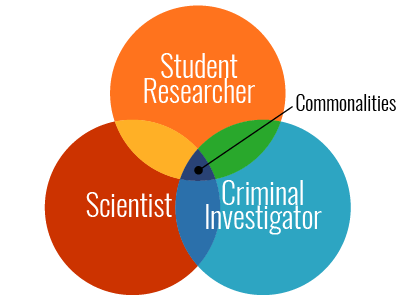6.2: Let’s Investigate!
- Page ID
- 86191
Search vs. Research
What is the difference between search and research? In our everyday vocabulary, these two terms are synonymous. However, in academic research, they are two separate concepts. We conduct a basic search when we are looking for quick answers, while research is a more involved process of inquiry. (1)
Watch the video, Search vs. Research to learn more about the difference between search and research.
“When you know the answer, or know that an answer exists, you search. When you don’t know the answer, or aren’t even sure about the question, you research.”
—Lane Wilkinson
Inquiry Process: Let’s Investigate!
What does the word inquiry mean? When you inquire about something, you ask questions to learn more. When you are asking questions, you are investigating. There are many professions that use investigation, especially in the sciences and criminal justice. They are inquisitive people who find answers and solve problems. Scholars, researchers (and yes, students!) use methods of investigation to find answers to their questions. Let’s compare their inquiry processes. (1)
Student Researcher
- Explores possibilities of a broad topic
- Breaks topic into subtopics & related issues
- Gathers background information & narrows focus of topic
- Develops a research question
- Answers question using information sources, which may raise new questions
- Synthesizes answers to identify connections; evaluates results,; develops a thesis
- Shares results; presents argument in a research paper
Scientist
- Makes an observation
- Analyzes observation
- Compares, sorts, organizes
- Examines empirical data, scientific theories, & laws
- Asks question
- Conducts background research
- Develops hypothesis; makes predictions
- Tests hypothesis with experiment or exploration, repeats as needed
- Analyzes data & results to answer question
- Records results; communicates findings
Criminal Investigator
- Secures crime scene to observe what happened
- Looks for evidence and witnesses
- Asks questions
- Answers questions, which may lead to new questions
- Solves the crime (synthesizes answers)
- Presents argument in court; shares findings

Commonalities of Inquiry Process
- Observes broad topic
- Narrows focus of research
- Analyzes parts of the whole
- Asks questions
- Answers questions
- Repeats steps 4 & 5 if needed (research is iterative; repetitive)
- Synthesizes answers; evaluates results
- Communicates findings
- Authored by: Florida State College at Jacksonville. License: CC BY: Attribution

